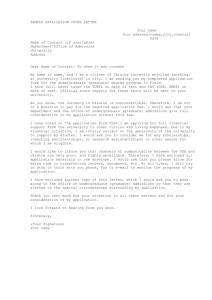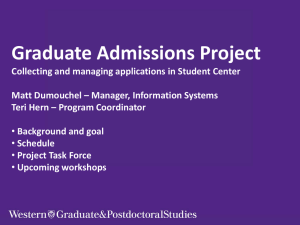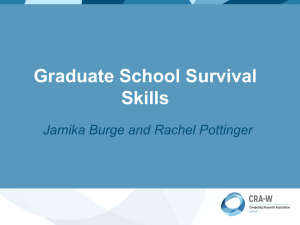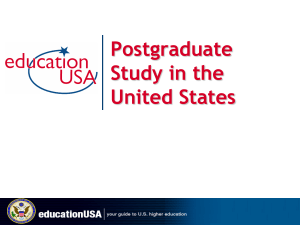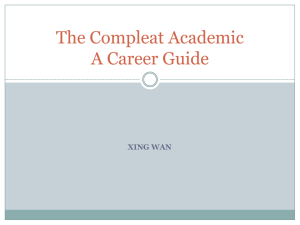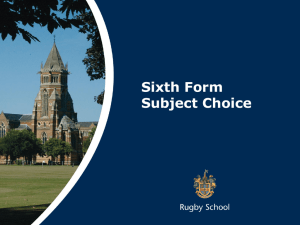Bob G
advertisement
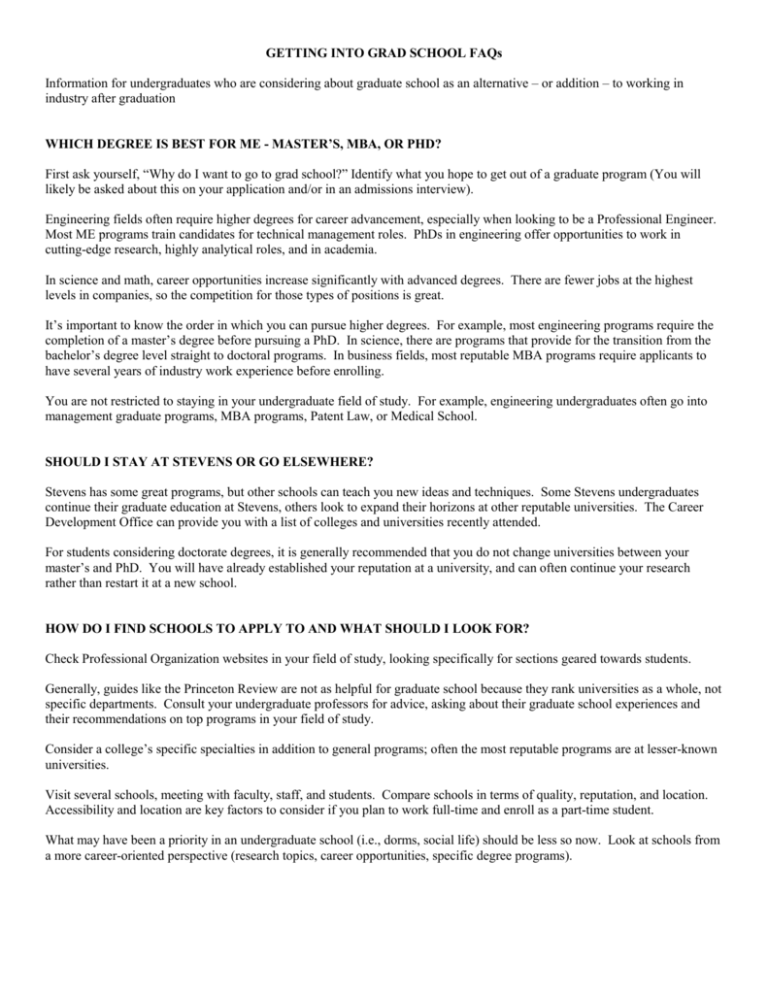
GETTING INTO GRAD SCHOOL FAQs Information for undergraduates who are considering about graduate school as an alternative – or addition – to working in industry after graduation WHICH DEGREE IS BEST FOR ME - MASTER’S, MBA, OR PHD? First ask yourself, “Why do I want to go to grad school?” Identify what you hope to get out of a graduate program (You will likely be asked about this on your application and/or in an admissions interview). Engineering fields often require higher degrees for career advancement, especially when looking to be a Professional Engineer. Most ME programs train candidates for technical management roles. PhDs in engineering offer opportunities to work in cutting-edge research, highly analytical roles, and in academia. In science and math, career opportunities increase significantly with advanced degrees. There are fewer jobs at the highest levels in companies, so the competition for those types of positions is great. It’s important to know the order in which you can pursue higher degrees. For example, most engineering programs require the completion of a master’s degree before pursuing a PhD. In science, there are programs that provide for the transition from the bachelor’s degree level straight to doctoral programs. In business fields, most reputable MBA programs require applicants to have several years of industry work experience before enrolling. You are not restricted to staying in your undergraduate field of study. For example, engineering undergraduates often go into management graduate programs, MBA programs, Patent Law, or Medical School. SHOULD I STAY AT STEVENS OR GO ELSEWHERE? Stevens has some great programs, but other schools can teach you new ideas and techniques. Some Stevens undergraduates continue their graduate education at Stevens, others look to expand their horizons at other reputable universities. The Career Development Office can provide you with a list of colleges and universities recently attended. For students considering doctorate degrees, it is generally recommended that you do not change universities between your master’s and PhD. You will have already established your reputation at a university, and can often continue your research rather than restart it at a new school. HOW DO I FIND SCHOOLS TO APPLY TO AND WHAT SHOULD I LOOK FOR? Check Professional Organization websites in your field of study, looking specifically for sections geared towards students. Generally, guides like the Princeton Review are not as helpful for graduate school because they rank universities as a whole, not specific departments. Consult your undergraduate professors for advice, asking about their graduate school experiences and their recommendations on top programs in your field of study. Consider a college’s specific specialties in addition to general programs; often the most reputable programs are at lesser-known universities. Visit several schools, meeting with faculty, staff, and students. Compare schools in terms of quality, reputation, and location. Accessibility and location are key factors to consider if you plan to work full-time and enroll as a part-time student. What may have been a priority in an undergraduate school (i.e., dorms, social life) should be less so now. Look at schools from a more career-oriented perspective (research topics, career opportunities, specific degree programs). HOW MANY SCHOOLS SHOULD I APPLY TO? Admissions processes can be time consuming and costly, so you should choose wisely in identifying the schools in which you are most interested. Apply to no more than six schools, two “ideal/perfect”, two “realistic”, and two “safety”. Visit schools you’re interested in – become an applicant, not an application. WHAT DO GRAD SCHOOL ADMISSIONS COMMITTEES LOOK FOR IN APPLICANTS? · Test Scores: Some require GMAT instead of GRE. For business/MBA programs, better schools require 3+ yrs industry experience. These programs also rely heavily on GMAT scores and personal interviews. Recommendations: Will be expected especially for a PhD. Standard number is three. Consider who you will ask. Faculty recommendations play a key role in decision-making. Graduate Admissions are “department centered”, unlike undergraduate schools that determine enrolled via “admissions committee”. WHEN SHOULD I APPLY TO GRAD SCHOOL? Each university (and often each individual program) has its own application timeframe. Most top schools have deadlines between in mid-December and early January. Some universities have “rolling admissions”, meaning candidates are reviewed and accepted as applications are received, not just after the end of the application deadline. Financial aid decisions, especially for assistantships, are generally decided around March, so even with rolling admissions, you should still apply as early as possible. HOW LONG WILL IT TAKE TO COMPLETE MY DEGREE? It depends on whether you go full-time or part-time. Generally, a FT master’s program can be completed in 2 years. If you opt for full-time, it’s easier to do immediately following your undergraduate studies; hard once start working FT to return to FT school. Typically, a PhD program has no time limits, although the average is 3-4 years beyond a master’s degree. It is very difficult to work full-time AND pursue a PhD, unless your job truly provides the research opportunities needed for the doctorate. Master’s degree programs generally require 12 academic classes; MBA programs require 20. HOW AM I GOING TO PAY FOR GRAD SCHOOL? Explore options for tuition stipends - Scholarships, loans, assistantships If you work full-time and go to school part-time, your employer may offer some form of tuition assistance. Some companies will restrict studies to a directly-related field. Some pay for tuition up-front, others offer reimbursement (meaning you pay first). Some will reimburse based on grade (i.e., 100% for an A, 80% for a B). Fellowship – These are not loans; they are highly competitive opportunities to engage in research. High GPAs expected to be competitive for Teaching Assistant/Research Assistant positions. Assistantships in business school are rare; most students pay their own way or obtain financing through their employer.
